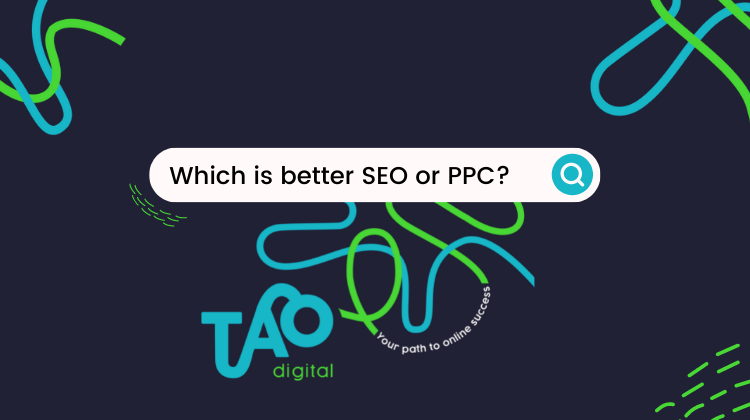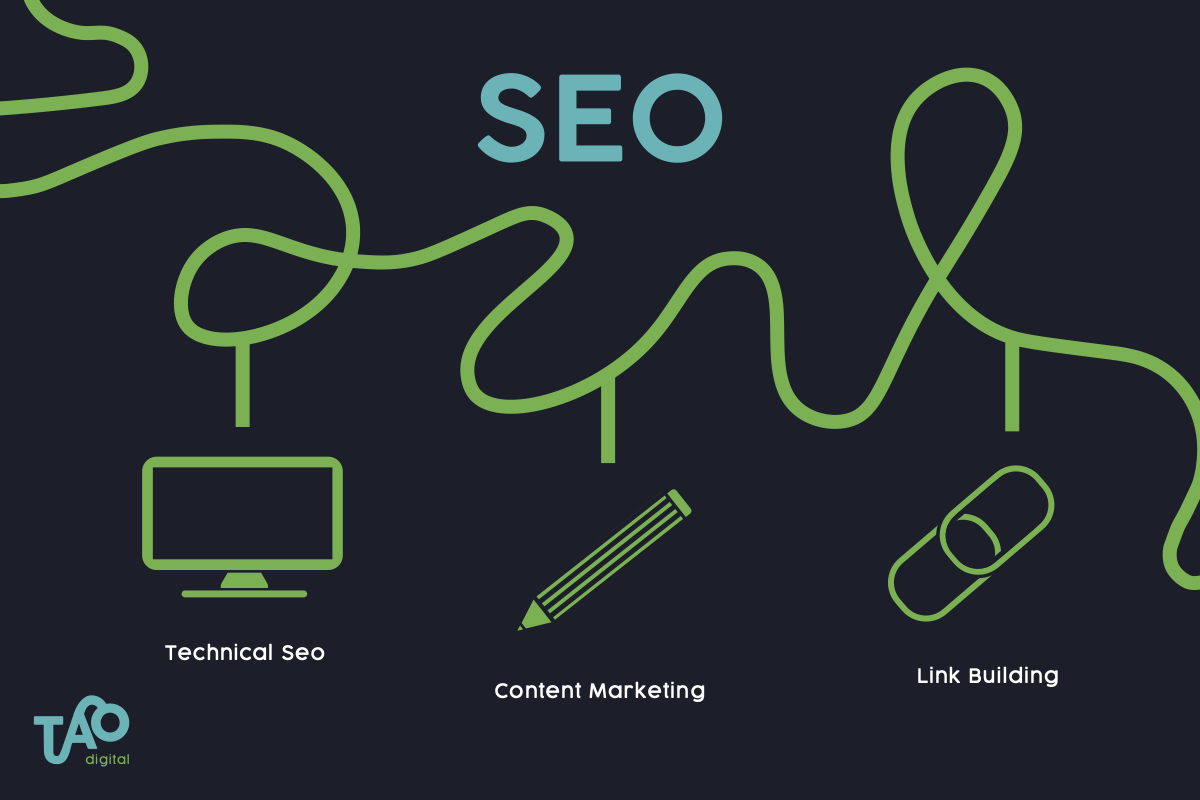12 Jul 2025
Matt Tomkin
SEO vs. PPC: Which is better?

As a search marketing agency, we get asked about SEO vs. PPC a lot. Of course, what we recommend completely depends on the client and their industry, and there are many things to consider before we look to recommend either channel.
In this guide, we’ve gone back to basics about what each of the processes involve (feel free to skip ahead if you’ve already got some understanding), how they can work together and the pros and cons of each.
What do SEO and PPC stand for?
SEO stands for ‘Search Engine Optimisation’ and PPC stands for ‘Pay Per Click’.
Search Engine Optimisation isn’t just a case of optimising your pages once and never looking at them again. Due to constantly changing search algorithms, site infrastructure updates, your competitor’s activity and much more, you constantly need to be on the ball to make your site as search engine friendly as possible. This is done through a mixture of technical SEO, content marketing and digital PR.

PPC refers to the ads that you see at the top of Google search results. As a business you will pay per every click received on your ad. It’s not a case of paying the highest, although this is a factor - rather, it’s all about the quality of your landing page experience, ad copy quality along with a whole host of other factors.

What is the difference between SEO and PPC?
There are a few differences between SEO and PPC to bear in mind:
The positioning on the SERP (Search Engine Results Page)
First and foremost, the most obvious difference between the two is their positioning on the SERP. The paid ads are the first results you see and are labelled as ads, as shown in the graphic above.
The organic results are shown from that point onwards and are what search engines believe to be the best match to a user’s query, starting from the best match and descending from there.
The goal for both search channels
With SEO, it’s likely that you want to boost the site's visibility in the search results, which is a great investment in the overall value of a business. There are a number of advantages to SEO, improving your keyword rankings, increasing your domain rating through gaining links, improving site traffic, bringing more site visitors that will lead to more sales and leads.
SEO is best viewed as a long term investment in your business, it can take some time and considerable investment to make major gains in organic search but the value keeps building over an extended period.
With PPC, you’re normally directing your site visitors to one page (often a particular service page you’d like to push, or a contact form we term a landing page) with the aim being to get users to take an action - ideally, buy a certain product or contact you for more information.
We wouldn't recommend starting a PPC campaign without having a very focused landing page, or set of landing pages, depending on the campaign and number of ad sets you are running.
The time frame
SEO is a long-term strategy and investment in your businesses long term lifespan.
Creating a new piece of content, whether a blog or new service page, goes live, you will need to wait till the search engines ‘index’ the page.
This can be sped up to an extent, but it completely depends on your website's authority and how important the search engines see your website. It can take 3-6 months before you start seeing traffic to the page - in fact, the average time a URL takes to hit page one is over 12 months, according to Ahrefs. On the other hand, paid ads are live immediately and can start generating results quickly when done correctly.
The sort of visitors you will bring to the site
Having managed PPC for a wide variety of clients, alongside undertaking SEO work, we have certainly noticed a difference in the sort of leads that each one will bring in.
With SEO, you’re likely to attract the sorts of visitors who may be at the top of the sales funnel. For example, if you’re a craft insurance business, many small craft businesses won’t know exactly what they need to cover them from claims - these sorts of visitors are at the top of the sales funnel.
Say for example they search a question such as: ‘What sort of insurance do I need for craft fairs?’. They may come across your piece of content, a guide to showcasing at a craft fair. After reading the guide and finding out the sort of insurance their business needs, they may request a quote from you as you have positioned yourself as an expert. (p.s. - you can also read our guide for more information on how to use Google searches to create content that answers user’s questions).
If you did want to target people who are more towards the bottom of the funnel, perhaps you want to create a highly targeted piece of content around getting a quote for insurance. SEO can target both top of funnel and bottom of funnel users, it all depends on the content produced and the competition for the terms.
With PPC you can attract visitors much further down the sales funnel who are either looking to make a purchase now or are looking for very quick results - e.g. someone who has left organising their car insurance until the last minute and is looking for a quote as soon as possible.
They may fill in forms from several of your competitors in order to see who responds first. This means that you may have to filter through more leads to see who is seriously considering buying your product or using your services.
In some instances, you may want to target further up the sales funnel, like promoting a piece of content or a guide, but typically we do see PPC being used for bottom of the funnel purposes.

How SEO and PPC work together
Although SEO and PPC do have their differences, you can seriously reap the benefits of using both together.
Getting greater target audience insights
PPC can give you invaluable data about your target audience. Once your ads have gone live, Google collects information about who is clicking on your ads, such as their age, gender, industry, job role, the area they live in, etc.
This data can help you to refine your next projects as part of ongoing SEO. For example, if you are a business coach and you see that owners of insurance businesses are clicking on your ads, you might want to create a piece of content or a service page around ‘Business Coaching for the Insurance Industry’. This can help you to continue bringing in leads through your PPC work and also attracting those leads organically too - it’s a win-win situation as you start to dominate the SERP!
Increased brand awareness
Using both together also boosts brand awareness. For example, someone might be carrying out some quick research about your industry, and once they visit your landing page from an ad they get a general idea of your offerings and who you are. They may get distracted and leave the site.
However, when that person searches again, or really does need your product this time, they will remember your name and click on your organic listing this time. Or, you could even use remarketing list search ads on Google and make sure you are there for both organic and paid ads.
Testing what works and using it in your SEO efforts
You can also test new keywords that can help with your SEO. Choose a word or phrase that you think you could potentially rank highly for and use it in your PPC ads. If you see great results, this is a sign that you should start to include this keyword in your content.
You can also review statistics such as time spent on the site and bounce rates to see what is working on your landing page and what isn’t - for example, are people getting tired of reading a huge piece of content, or is a call to action too far down? This can help you avoid the same mistake in other pieces of content across the whole site.
Does PPC affect SEO?
Not directly, but as we’ve touched on, you can use the insights to better your SEO. It can be part of your overall SEO strategy, but it’s not essential to your efforts, especially if you have a smaller budget starting out.
What are the pros and cons of SEO and PPC?
SEO: Pros
SEO: Cons

PPC: Pros
PPC: Cons

So, which is better overall?
Sorry to go for the typical SEO answer here, but really… it depends (yes, we can hear you booing over there).
If you want quick results and know how to optimise a campaign as best you can, PPC might be the best option for you.
However, if you want to put the effort into an SEO strategy over time and bring in consistent organic results, that could be a better choice.
In our honest opinion, a combination of both works really well due to the insights you can get. For the clients we do this for, we are constantly reviewing PPC campaigns to see what’s working and what isn’t, then implementing this into their content.
If you want great results that will take your business to the next level, get in touch with us today. All of our clients receive monthly video reports that prove real return on investment and growth over time.